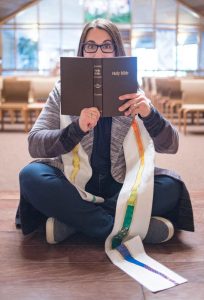 There is a song called “Mary Did You Know?” The lyrics were penned in 1984 by Mark Lowry. In 1991 Buddy Greene put it to music and signer Michael English recorded it that same year. Since then, it’s appeared on country, R&B, and the Billboard Hot 100 charts (that last in 2014). The 2014 version is performed by Pentatonix, and it’s my favorite version. But I first heard the song just over a decade ago, sitting in a United Methodist Church during Advent. I cried.
There is a song called “Mary Did You Know?” The lyrics were penned in 1984 by Mark Lowry. In 1991 Buddy Greene put it to music and signer Michael English recorded it that same year. Since then, it’s appeared on country, R&B, and the Billboard Hot 100 charts (that last in 2014). The 2014 version is performed by Pentatonix, and it’s my favorite version. But I first heard the song just over a decade ago, sitting in a United Methodist Church during Advent. I cried.
It’s a bit embarrassing to admit that the song brought me to tears, especially when reading this from the Wikipedia entry on the song: “The text has received criticism for perceived ambiguity or lack of scriptural or theological depth. For example, Lutheran writer Holly Scheer, in addressing the rhetorical question of the song’s title, wrote: ‘Anyone who has even a slight familiarity with the biblical account of Christ’s conception and birth shouldn’t need to ask if Mary knew, because the Bible plainly tells us she did.’ Baptist theologian Michael Frost suggests it is the ‘most sexist Christmas song ever written… It treats her like a clueless child… Could you imagine a song asking Abraham 17 times if he knew he’d be the father of a great nation?'”
Ouch. And yet, the song, written to the Mother of Jesus Christ, feels relatable to me, and when it asks, “Mary did you know, that your baby boy, would someday walk on water?” I get misty. Because while I’m all for responsible interpretation of Scripture, and quite squarely against condescending sexism, Scripture just doesn’t actually say a whole lot about Mary and this God Child she carried into existence as Emmanuel, literally, “God with Us.”
The Gospels of John and Mark don’t mention the birth narrative at all. Matthew has an angel appearing to Joseph, not Mary, who says at 1:21, “he will save his people from their sins.” Luke gives us this word from the angel Gabriel to Mary starting at 1:32, “He [Jesus] will be great, and will be called the Son of the Most High, and the Lord God will give o him the throne of his ancestor David. He will reign over the house of Jacob forever, and of his kingdom there will be no end.” Mary replies, a few verses later, “Here I am, the servant of the Lord’; let it be with me according to your word.” Then off pops Gabriel.
There was no step-by-step unveiling of prophetic details, “on this day he will restore sight to the blind, on this he will die.” So when the song, sappy though some may think it, asks, “Did you know that your baby boy has walked where angels trod? When you kiss your little baby, you kiss the face of God,” I’m willing to live into those questions with my heart and soul. Because we, as the people Christ was sent to save, wrestle with exactly this kind of question when we think about this babe to born, when we wait on the revelation of Christ, Emmanuel, God with Us in the world as we do now in Advent.
If there’s any part of my faith that I want my heart and soul involved with, it’s this: How do I know, love, follow, and understand this baby who became a savior? And if Mary, who we know from Luke 1:29, was “much perplexed by [Gabriel’s words of greeting] and pondered what sort of greeting this might be,” then we can wonder, too. Because wonder is precious and good, as Mary, little spotlight that she does get, reminds us once again when she holds that baby in her arms and absorbs the witness of the shepherds (Luke 2:17-19). “When they saw [Jesus in the manger as the angels had promised], they made known what had been told to them about this child; and all who heard it were amazed at what the shepherds told them. But Mary treasured all these words and pondered them in her heart.”
She knew what we all know about Christ, that he is God’s own and only, and that he came to save us through love and justice in God’s name. It seems Mary also was ignorant, just as we are, humans all, of the particular and specific ways in which Jesus would work in the world and works still.
This Advent, let us treasure and ponder, let us store the promise of God with Us in our hearts, and let us try to let go of controlling the narrative and instead engage in teary-eyed wonder.





